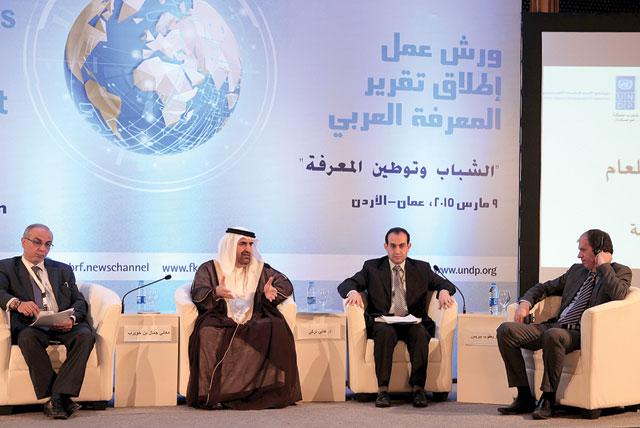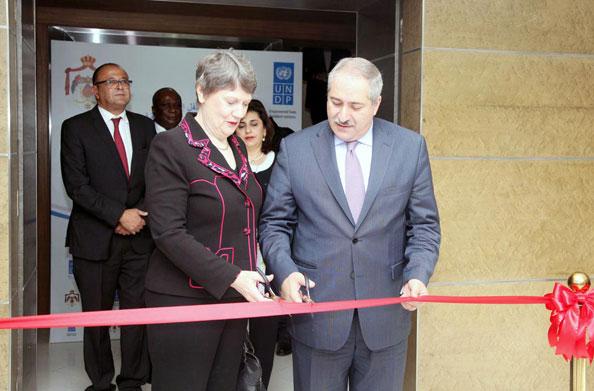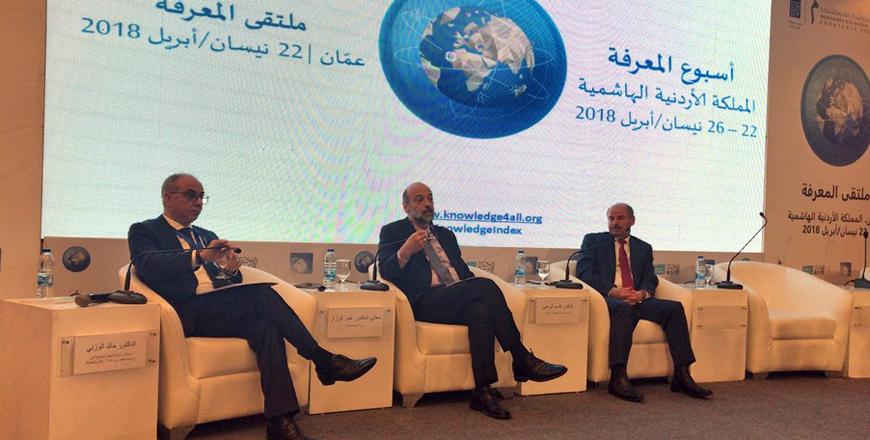You are here
Almost half of Jordanian student sample 'below average in cognitive skills' — exam results
By Laila Azzeh - Mar 09,2015 - Last updated at Mar 09,2015

AMMAN — There is a "weakness" in the different levels of education in Jordan, particularly in regards to cognitive communication through writing, and the use of languages and technology, according to a recent report.
This observation is among the outcomes of the 2014 Arab Knowledge Report, which also showed that Jordanian students demonstrated "average" performance in tests conducted as part of the study.
"About 49 per cent of the sample of students who sat for exams that gauge their knowledge ranked below average in cognitive skills, while only 2 per cent scored higher than 79 per cent," said the report, the results of which were highlighted at a workshop held by the Mohammed Bin Rashid Al Maktoum Foundation (MBRF) in cooperation with UNDP.
The "Youth and Localisation of Knowledge" survey also charged that the results of tests measuring Jordanian students' technology skills were "shocking", especially in light of the national efforts to spread the use of technology in all scientific and professional fields.
"The results perhaps show universities' weak interest in urging students to use technology for academic purposes," said the report, which also noted that this is the case despite the "high" rate of Internet penetration.
In addition, the study underlined that although English is taught in school from early grades, there are complaints of public school students' poor English language skills, unlike those studying at private educational institutions.
"And since the vast majority of Jordanian university students come from public schools, English proficiency among graduates is in need of more support," said the report.
On the bright side, the average number of education years in the Arab world was estimated at 11.8 last year, but stood at 13.5 in Jordan, while 18 per cent of the population holds a higher education degree, compared to 9 per cent in Egypt and Tunisia.
"Jordan is one of the countries that agreed to take part in the three surveys, which shows a commitment to development. We take the recommendations of the report very seriously," said Jordanian economist Khalid Wazani.
"We know that primary education is declining in Jordan, but there is an unprecedented strong will today to change the status quo," noted Wazani, who also served as a member of the report's central team.
The study highlights a pressing issue facing Arab societies — the effective integration of youth in the transfer and localisation of knowledge.
It also explores the current status of young Arabs in relation to skills and values required for the effective integration of knowledge, and their contribution to culture, politics and society.
In addition, the report examines the situation of existing enabling environments, and their capacity to expand opportunities for young people and build their capabilities.
The Arab region's "advancement" towards knowledge economies and bridging the knowledge gap is still "significant", according to the study.
"The third Arab Knowledge Report, and as it appears from this year's title, seeks to find successful ways to realise an effective participation of youth in central issues," noted Jamal Bin Huwaireb, managing director of MBRF.
The report highlighted a number of challenges, including the "weakness" of the private sector and the expansion of the public sector.
"Unfortunately, the private sector does not care about the production of knowledge, although investing in this area would bring massive transformations in this regard," Huwaireb said.
He added that a meeting will be held in Oxford soon with Arab stakeholders to become acquainted with the way European private companies support knowledge.
More than 200 university students, education experts and specialists in the field of knowledge took part in the workshop, the first of a series of five workshops to be held in several countries to discuss the findings of the report in cooperation with academics, experts and young people.
"The panel discussions will provide us with the opportunity to engage directly with the youths to listen to their views and identify their needs, which will help the foundation in the preparation for [the year's] first knowledge conference... This will also help us find innovative solutions that meet the aspirations of young Arabs," Huwaireb added.
Yakup Beris, regional programme coordinator at the UNDP Regional Bureau for Arab States, noted that the agency's regional programme seeks to generate knowledge and enable its use for development.
"By acquiring knowledge and making the best use of it with local realities, youth would also make families, communities and nations stronger," he said.
Established in 2003, MBRF aims to empower future generations to devise sustainable solutions that address challenges in the knowledge and research domains in the Arab world.
Related Articles
AMMAN — Jordan ranked 79 globally, among 138 countries, on the Global Knowledge Index (GKI) 2020 with a score of 43.9, close to the world av
AMMAN — The UN Development Programme (UNDP) sees the capital as the "ideal location" for its Regional Hub for Arab States (RHAB), UNDP Admin
AMMAN — A knowledge forum bringing together representatives from ministries, journalists, researchers, students and representatives from the


















